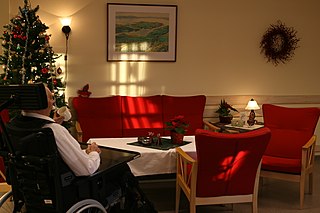Related Research Articles
A nursing home is a facility for the residential care of older people, senior citizens, or disabled people. Nursing homes may also be referred to as care homes, skilled nursing facilities (SNF) or long-term care facilities. Often, these terms have slightly different meanings to indicate whether the institutions are public or private, and whether they provide mostly assisted living, or nursing care and emergency medical care. Nursing homes are used by people who do not need to be in a hospital, but require care that is hard to provide in a home setting. The nursing home staff attends to the patients' medical and other needs. Most nursing homes have nursing aides and skilled nurses on hand 24 hours a day.

Geriatrics, or geriatric medicine, is a medical specialty focused on providing care for the unique health needs of the elderly. The term geriatrics originates from the Greek γέρων geron meaning "old man", and ιατρός iatros meaning "healer". It aims to promote health by preventing, diagnosing and treating disease in older adults. There is no defined age at which patients may be under the care of a geriatrician, or geriatric physician, a physician who specializes in the care of older people. Rather, this decision is guided by individual patient need and the caregiving structures available to them. This care may benefit those who are managing multiple chronic conditions or experiencing significant age-related complications that threaten quality of daily life. Geriatric care may be indicated if caregiving responsibilities become increasingly stressful or medically complex for family and caregivers to manage independently.
A dietitian, medical dietitian, or dietician is an expert in identifying and treating disease-related malnutrition and in conducting medical nutrition therapy, for example designing an enteral tube feeding regimen or mitigating the effects of cancer cachexia. Many dietitians work in hospitals and usually see specific patients where a nutritional assessment and intervention has been requested by a doctor or nurse, for example if a patient has lost their ability to swallow or requires artificial nutrition due to intestinal failure. Dietitians are regulated healthcare professionals licensed to assess, diagnose, and treat such problems. In the United Kingdom, dietitian is a 'protected title', meaning identifying yourself as a dietitian without appropriate education and registration is prohibited by law.

An assisted living residence or assisted living facility (ALF) is a housing facility for people with disabilities or for adults who cannot or who choose not to live independently. The term is popular in the United States. Still, the setting is similar to a retirement home, in the sense that facilities provide a group living environment and typically cater to an older adult population. There is also Caribbean assisted living, which offers a similar service in a resort-like environment.

Elderly care, or simply eldercare, serves the needs of old adults. It encompasses assisted living, adult daycare, long-term care, nursing homes, hospice care, and home care.
In social work, a caseworker is not a social worker but is employed by a government agency, nonprofit organization, or another group to take on the cases of individuals and provide them with advocacy, information and solutions. Also, in political arenas, caseworkers are employed as a type of legislative staffer by legislators to provide service to their constituents such as dealing with individual or family concerns. A social worker who works as a caseworker obtains social casework education and training naturally through their compulsory degree works. In social work, casework means to engage a client in learning their situation, to build a suitable plan of action, and helping the client to solve their problems through client commitment and use of their own and community resources, the coordinated service is called case management. British MPs and members of the United States Congress often provide constituent services through caseworkers for better use of their allotted funds.
Nursing assessment is the gathering of information about a patient's physiological, psychological, sociological, and spiritual status by a licensed Registered Nurse. Nursing assessment is the first step in the nursing process. A section of the nursing assessment may be delegated to certified nurses aides. Vitals and EKG's may be delegated to certified nurses aides or nursing techs. It differs from a medical diagnosis. In some instances, the nursing assessment is very broad in scope and in other cases it may focus on one body system or mental health. Nursing assessment is used to identify current and future patient care needs. It incorporates the recognition of normal versus abnormal body physiology. Prompt recognition of pertinent changes along with the skill of critical thinking allows the nurse to identify and prioritize appropriate interventions. An assessment format may already be in place to be used at specific facilities and in specific circumstances.

Long-term care (LTC) is a variety of services which help meet both the medical and non-medical needs of people with a chronic illness or disability who cannot care for themselves for long periods. Long-term care is focused on individualized and coordinated services that promote independence, maximize patients' quality of life, and meet patients' needs over a period of time.
Home health is a nursing specialty in which nurses provide multidimensional home care to patients of all ages. Home health care is a cost efficient way to deliver quality care in the convenience of the client's home. Home health nurses create care plans to achieve goals based on the client's diagnosis. These plans can include preventive, therapeutic, and rehabilitative actions. Home health nurses also supervise certified nursing assistants. The professional nursing organization for home health nurses is the Home Healthcare Nurses Association (HHNA). Home health care is intended for clients that are well enough to be discharged home, but still require skilled nursing personnel to assess, initiate and oversee nursing interventions.
Case management is a managed care technique within the health care coverage system of the United States. It involves an integrated system that manages the delivery of comprehensive healthcare services for enrolled patients. Case managers are employed in almost every aspect of health care and these employ different approaches in the control of clinical actions.

Gerontological nursing is the specialty of nursing pertaining to older adults. Gerontological nurses work in collaboration with older adults, their families, and communities to support healthy aging, maximum functioning, and quality of life. The term gerontological nursing, which replaced the term geriatric nursing in the 1970s, is seen as being more consistent with the specialty's broader focus on health and wellness, in addition to illness.
Bet Tzedek is an American nonprofit human and poverty rights organization based in Los Angeles, California.
Geriatric medicine, as a speciality, was introduced in Egypt in 1982, and in 1984 a geriatrics and gerontology unit in Ain Shams University Faculty of Medicine was established.
A professional live-in caregiver provides personal care and assistance to individuals, including those suffering from chronic illness, Alzheimer's disease, and dementia, within the home setting. Typical duties of a live-in caregiver include meal planning and preparation, assistance with grooming, dressing and toileting, medication management, laundry and light housekeeping, and transportation/escorts to doctor's appointments or social engagements. Professional live-in caregivers are often provided by an outside agency, which may also coordinate their services with the client's preferred in-home health agency and other medical providers.

Nurses Improving Care for Healthsystem Elders (NICHE) is a program of the Hartford Institute for Geriatric Nursing at New York University College of Nursing, that works to achieve systematic nursing change to benefit hospitalized older patients. Founded in 1992, NICHE has evolved into a national geriatric nursing program comprising over 620 hospitals in more than 40 states as well as parts of Canada.

Bread for the City is a comprehensive front line agency serving the poor of Washington, D.C., USA. The agency began as two organizations: Zacchaeus Free Clinic, and Bread for the City, a project by a coalition of downtown DC churches created in 1974 to feed and clothe the poor. As of 2011 Bread for the City offered food, clothing, social services, legal representation and medical care without charge to eligible DC residents.

Unlicensed assistive personnel (UAP) are paraprofessionals who assist individuals with physical disabilities, mental impairments, and other health care needs with their activities of daily living (ADLs). UAPs also provide bedside care—including basic nursing procedures—all under the supervision of a registered nurse, licensed practical nurse or other health care professional. UAPs must demonstrate their ability and competence before gaining any expanded responsibilities in a clinical setting. While providing this care, UAPs offer compassion and patience and are part of the patient's healthcare support system. Communication between UAPs and registered nurses (RNs) is key as they are working together in their patients' best interests. The scope of care UAPs are responsible for is delegated by RNs or other clinical licensed professionals.
As of 2017, approximately 1.4 million Americans live in a nursing home, two-thirds of whom rely on Medicaid to pay for their care. Residential nursing facilities receive Medicaid federal funding and approvals through a state health department. These facilities may be overseen by various types of state agency.

Aged care in Australia, is the provision of services to meet the unique needs of older people in Australia. It includes both residential aged care as well as services provided in the home such as personal care, domestic assistance, home nursing, nutrition and meal preparation, respite services, continence management, mobility & dexterity assistance, transport, social support and the provision of equipment and aids.
Comprehensive geriatric assessment (CGA) is a process used by healthcare practitioners to assess the status of people who are frail and older in order to optimize their subsequent management. These people often have complex, multiple and interdependent problems (multimorbidity) which make their care more challenging than in younger people, or those with just one medical problem. CGA is the core work of specialists in the care of older people, although many other health care practitioners either have not heard of it, or are not aware of what it actually is. It is also called "multidimensional geriatric assessment."
References
- ↑ Cress, Cathy Jo. Handbook of Geriatric Care Management. Jones & Bartlett Publishers, 2010.
- ↑ National Association of Professional Geriatric Care Managers. "What is a Geriatric Care Manager?" Archived 2005-09-07 at the Wayback Machine Tucson, AZ. Accessed 8 August 2011.
- ↑ SeniorMag.com. Geriatric Care Management (Assessment). Accessed 8 August 2011.